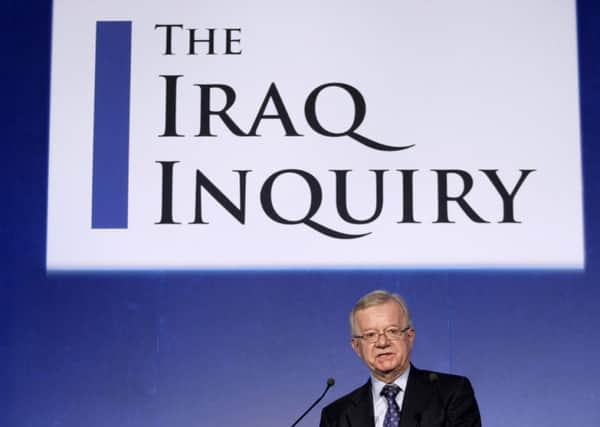Iraq report delays ‘very serious’


Sir John Chilcot’s inquiry completed public hearings in 2011, but publication of its report is understood to have been held back by negotiations over the publication of private communications between Tony Blair, prime minister at the time of the conflict, and then US president George Bush.
The House of Commons Public Administration Select Committee, which examines the quality and standards of administration within the Civil Service, described the delay as “very serious” and “at least four years overdue”.
Advertisement
Hide AdAdvertisement
Hide AdIts chairman, Bernard Jenkin, has written to the Cabinet Office demanding an explanation for the hold-up.
He made clear that he is ready to summon ministers, and Cabinet Secretary Sir Jeremy Heywood - a key aide to Mr Blair in the run up to the invasion - for questioning on the reason why the report has not yet been published.
In an interview on BBC2’s Daily Politics yesterday, Mr Jenkin said: “It’s very serious that this report is now at least four years overdue, so we’ve written to the minister to ask for an explanation as to why these delays have occurred, what is holding up the publication of the report and how these issues are going to be resolved.
“On the basis of that we may well call for the minister, or indeed the Cabinet Secretary, to come and give us evidence to explain how they are going to sort this out.”
Advertisement
Hide AdAdvertisement
Hide AdAn inquiry into the Iraq War was announced by then-Prime Minister Gordon Brown in June 2009, and launched the following month with Sir John at its chair.
It examined the period from 2001 to the end of 2009.
Although a formal date for the publication of the report was never set, it was widely expected to be published last year.
Following the completion of his inquiry, Sir John began a process known as “Maxwellisation” under which individuals facing criticism in the report are given an opportunity to respond before publication.
In a letter to David Cameron last November, he said he was in discussions with Sir Jeremy, the Government’s most senior civil servant, over his plan to publish sensitive material, covering some 200 Cabinet-level discussions, 25 notes from Mr Blair to Mr Bush and more than 130 records of conversations between the PM and the US president.
Advertisement
Hide AdAdvertisement
Hide AdNo agreement had yet been reached on the “most difficult” categories of documents, he said.
A Cabinet Office spokesman said there had been constructive dialogue with the inquiry and the process would be concluded as quickly as possible.
The inquiry’s remit covered the decision to go to war, whether troops were properly prepared, how the conflict was conducted and what planning there was for its aftermath.
Between 2003 and 2009, 179 British service personnel were killed in Iraq.
Advertisement
Hide AdAdvertisement
Hide AdIn February, former attorney general Lord Morris of Aberavon, told the House of Lords that delays in publishing the report risk “denying justice” to the public.
• On Tuesday the International Criminal Court announced it was examining allegations that UK forces in Iraq were responsible for the “systematic abuse” of detainees. Attorney General Dominic Grieve said the Government “completely rejects” the allegations, but indicated it would co-operate with the inquiry.